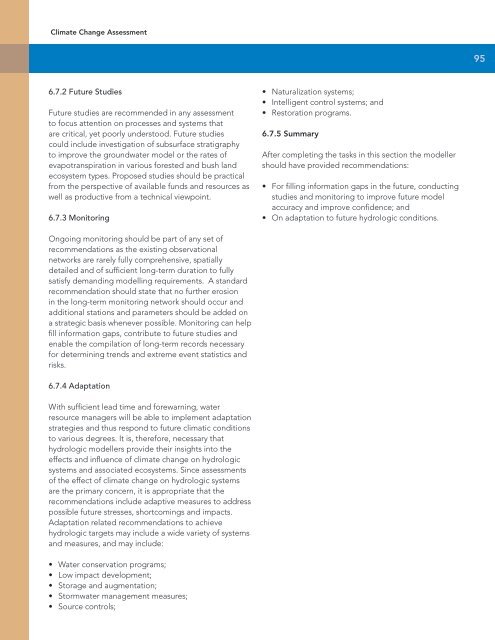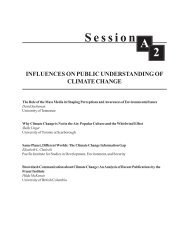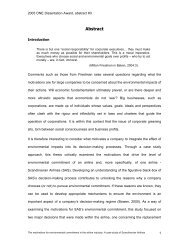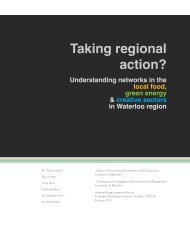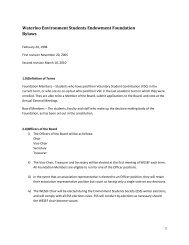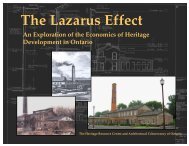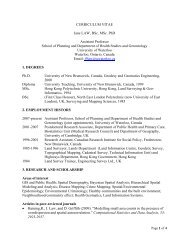ClimateChange Assessment Guide.pdf - University of Waterloo
ClimateChange Assessment Guide.pdf - University of Waterloo
ClimateChange Assessment Guide.pdf - University of Waterloo
You also want an ePaper? Increase the reach of your titles
YUMPU automatically turns print PDFs into web optimized ePapers that Google loves.
Climate Change <strong>Assessment</strong>956.7.2 Future StudiesFuture studies are recommended in any assessmentto focus attention on processes and systems thatare critical, yet poorly understood. Future studiescould include investigation <strong>of</strong> subsurface stratigraphyto improve the groundwater model or the rates <strong>of</strong>evapotranspiration in various forested and bush landecosystem types. Proposed studies should be practicalfrom the perspective <strong>of</strong> available funds and resources aswell as productive from a technical viewpoint.6.7.3 Monitoring• Naturalization systems;• Intelligent control systems; and• Restoration programs.6.7.5 SummaryAfter completing the tasks in this section the modellershould have provided recommendations:• For filling information gaps in the future, conductingstudies and monitoring to improve future modelaccuracy and improve confidence; and• On adaptation to future hydrologic conditions.Ongoing monitoring should be part <strong>of</strong> any set <strong>of</strong>recommendations as the existing observationalnetworks are rarely fully comprehensive, spatiallydetailed and <strong>of</strong> sufficient long-term duration to fullysatisfy demanding modelling requirements. A standardrecommendation should state that no further erosionin the long-term monitoring network should occur andadditional stations and parameters should be added ona strategic basis whenever possible. Monitoring can helpfill information gaps, contribute to future studies andenable the compilation <strong>of</strong> long-term records necessaryfor determining trends and extreme event statistics andrisks.6.7.4 AdaptationWith sufficient lead time and forewarning, waterresource managers will be able to implement adaptationstrategies and thus respond to future climatic conditionsto various degrees. It is, therefore, necessary thathydrologic modellers provide their insights into theeffects and influence <strong>of</strong> climate change on hydrologicsystems and associated ecosystems. Since assessments<strong>of</strong> the effect <strong>of</strong> climate change on hydrologic systemsare the primary concern, it is appropriate that therecommendations include adaptive measures to addresspossible future stresses, shortcomings and impacts.Adaptation related recommendations to achievehydrologic targets may include a wide variety <strong>of</strong> systemsand measures, and may include:• Water conservation programs;• Low impact development;• Storage and augmentation;• Stormwater management measures;• Source controls;


